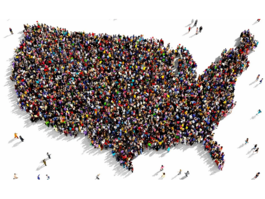35% of Gun Owners Bought More Guns in the Past Year
Americans have been on a gun-buying spree the past year, to such an extent that many firearms owners now report difficulty finding enough ammunition.

Americans have been on a gun-buying spree the past year, to such an extent that many firearms owners now report difficulty finding enough ammunition.

In the wake of Facebook’s decision to permanently ban former President Donald Trump from the platform, a majority of voters now favor ending legal protections for social media companies.

On the surface, Joe Biden seems to be doing pretty well. But underneath, there are signs of problems, areas where partisan overstretch threatens the underpinnings of what some are hailing as the new order of things.

"There are few ways in which a man can be more innocently employed than in getting money," is an insight the famed biographer James Boswell attributed to Samuel Johnson.

It may be that the biggest loser in last year’s election wasn’t a political candidate, but CNN, which has seen its ratings drop precipitously since former President Donald Trump left office in January.

— A majority of states are now either solidly Republican or solidly Democratic on the presidential level, and the party a state prefers for president increasingly has a big edge in winning the state’s two Senate seats. Given these patterns, it’s possible to game out the basic contours of what the Senate “should” look like in the near future, barring some unexpected upheaval.
— Allocating Senate seats based on current presidential preferences produces an equilibrium of about 53 seats for the Republicans and 47 seats for the Democrats.
— This complicates the Democrats’ decision on whether to ditch the filibuster, because in a chamber where they may end up spending a lot of time in the minority in the future, ending the filibuster may destroy one of the few points of leverage the party would have.

President Joe Biden’s $2 trillion infrastructure plan has support from a majority of voters, but an even larger majority want Biden and Democrats to compromise with congressional Republicans infrastructure spending.

More than half of Americans say they know someone who is looking for a job, and their views on the current job market are worse than they’ve been in several years.

Americans took out $1.7 trillion in government loans for college tuition.

The Rasmussen Reports Immigration Index for the week of April 25-29, 2021 rose to 86.9, up from 83.7 two weeks earlier. The index is now as high as it’s been since early February; it reached a record low of 82.3 in late March.

The good news is that half of Americans now believe we are winning the war against COVID-19. The bad news is, nearly half still want you to keep wearing a mask, even if you’re vaccinated against the virus.

There is something very fishy about the new 2020 Census Bureau data determining which states picked up seats and which states lost seats.

"Hear me clearly: America is not a racist country."

Thirty-nine percent (39%) of Likely U.S. Voters think the country is heading in the right direction, according to a new Rasmussen Reports national telephone and online survey for the week ending April 29, 2021.

Most voters view domestic terrorism as a greater danger to America than foreign threats, and don’t have much confidence that President Biden can cope with the threat.

Ahead of a presidential election, opinion polls are a major news item. Most of these polls are not designed to reflect public opinion but instead to shape it. As most big media leans left, such shaping is always to the benefit of the Democrat party.

In surveys last week, this is what America told Rasmussen Reports...

When tracking President Biden’s job approval on a daily basis, people sometimes get so caught up in the day-to-day fluctuations that they miss the bigger picture.

Despite all the criticism capitalism has endured in recent years, American voters still overwhelmingly prefer it to socialism.

The COVID-delayed results of the 2020 census are finally in, with totals for the 50 states and the District of Columbia at nearly one-third of a billion -- 331,449,281 -- and with surprises having to do with the short run and what French historians call the "longue duree."